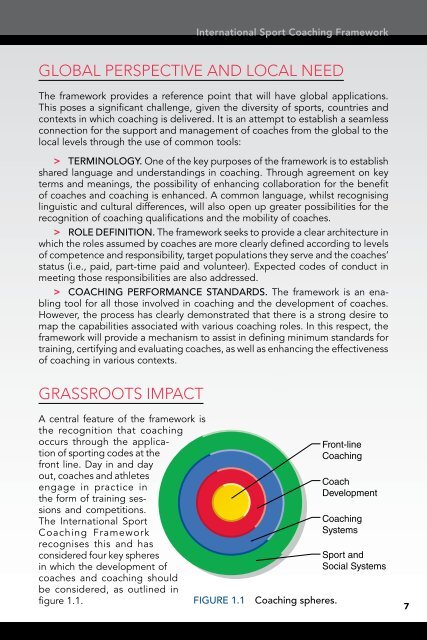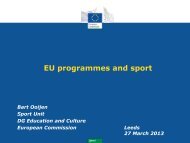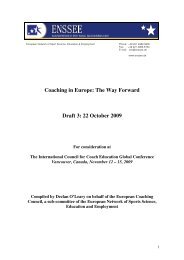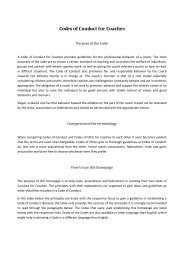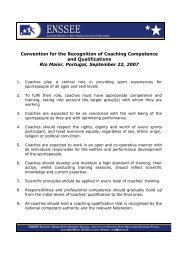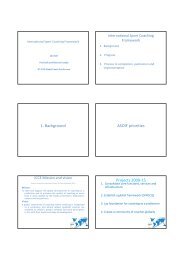International Sport Coaching Framework â version 1.1
International Sport Coaching Framework â version 1.1
International Sport Coaching Framework â version 1.1
You also want an ePaper? Increase the reach of your titles
YUMPU automatically turns print PDFs into web optimized ePapers that Google loves.
<strong>International</strong> <strong>Sport</strong> <strong>Coaching</strong> <strong>Framework</strong><br />
GLOBAL PERSPECTIVE AND LOCAL NEED<br />
The framework provides a reference point that will have global applications.<br />
This poses a significant challenge, given the diversity of sports, countries and<br />
contexts in which coaching is delivered. It is an attempt to establish a seamless<br />
connection for the support and management of coaches from the global to the<br />
local levels through the use of common tools:<br />
> TERMINOLOGY. One of the key purposes of the framework is to establish<br />
shared language and understandings in coaching. Through agreement on key<br />
terms and meanings, the possibility of enhancing collaboration for the benefit<br />
of coaches and coaching is enhanced. A common language, whilst recognising<br />
linguistic and cultural differences, will also open up greater possibilities for the<br />
recognition of coaching qualifications and the mobility of coaches.<br />
> ROLE DEFINITION. The framework seeks to provide a clear architecture in<br />
which the roles assumed by coaches are more clearly defined according to levels<br />
of competence and responsibility, target populations they serve and the coaches’<br />
status (i.e., paid, part-time paid and volunteer). Expected codes of conduct in<br />
meeting those responsibilities are also addressed.<br />
> COACHING PERFORMANCE STANDARDS. The framework is an enabling<br />
tool for all those involved in coaching and the development of coaches.<br />
However, the process has clearly demonstrated that there is a strong desire to<br />
map the capabilities associated with various coaching roles. In this respect, the<br />
framework will provide a mechanism to assist in defining minimum standards for<br />
training, certifying and evaluating coaches, as well as enhancing the effectiveness<br />
of coaching in various contexts.<br />
GRASSROOTS IMPACT<br />
A central feature of the framework is<br />
the recognition that coaching<br />
occurs through the application<br />
of sporting codes at the<br />
front line. Day in and day<br />
out, coaches and athletes<br />
engage in practice in<br />
the form of training sessions<br />
and competitions.<br />
The <strong>International</strong> <strong>Sport</strong><br />
<strong>Coaching</strong> <strong>Framework</strong><br />
recognises this and has<br />
considered four key spheres<br />
in which the development of<br />
coaches and coaching should<br />
be considered, as outlined in<br />
figure <strong>1.1</strong>.<br />
FIGURE <strong>1.1</strong> <strong>Coaching</strong> spheres.<br />
Figure <strong>1.1</strong><br />
Front-line<br />
<strong>Coaching</strong><br />
Coach<br />
Development<br />
<strong>Coaching</strong><br />
Systems<br />
<strong>Sport</strong> and<br />
Social Systems<br />
7


